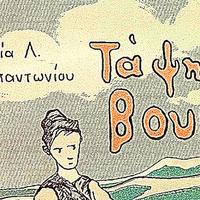41. Το τραγούδι της Αφρόδως
|song||Aphrodite's
41. Das Lied der Aphrodite
41\. The song of Venus
41. La canción de Afrodita
41 Le chant d'Aphrodite
41. Pieśń Afrodyty
41. O Canto de Afrodite
41. Afrodit'in Şarkısı
Η Αφρόδω ήρθε σήμερα μαζί με τον Λάμπρο να δει τ' αδέρφια της.
||came|today|together|||||see||siblings|
Afrodo came today with Lambros to see her brothers.
Έναν αδερφό είχε, τον Λάμπρο, και τώρα έγιναν είκοσι έξι!
|brother|had|||||they became||
He had one brother, Lambros, and now they are twenty-six!
Μα και τα παιδιά ποτέ δεν έλεγαν πως θα έβρισκαν εκεί απάνω τόσο καλή αδερφή.
||||||they said|how||they would find||up there|so much||
But even the children never said they would find such a good sister up there.
Εδώ και τρεις μέρες τούς είπε το πιο καλό παραμύθι.
here|||||||||fairy tale
Three days ago he told them the best story.
Είπε για ένα κάστρο που είχε πόρτες ατσαλένιες και κλειδιά αργυρά· για της Ωριάς το κάστρο.
He said||||||steel doors|steel||keys|silver|||the Virgin||castle
He told of a castle that had doors of steel and keys of silver; of the castle of Oria.
---
Προχτές τραγούδησε στον Φάνη και στον Δημητράκη ένα τραγούδι που άρχιζε με τα λόγια: «Απόψε ‘νειρευόμουνα».
the other day|he sang|||||||||began|||words|tonight|I was dreaming
The day before yesterday he sang to Fanis and Dimitrakis a song that began with the words, "Tonight I dreamed."
Το είπε χαμηλοβλέποντας και κοιτάζοντας τη ρόκα.
||looking down||looking||arugula
He said it, looking down at the rocket.
Απόψε ‘νειρευόμουνα –μητέρα, μητερίτσα μου– ψηλόν πύργον ανέβαινα, σε περιβόλι έμπαινα
|I was dreaming|mother|mother||tall|tower|climbed up||orchard|entered garden
Tonight I was dreaming, mother, my mother, I was climbing a high tower, entering an orchard.
και δυο ποτάμια με νερό,
and two rivers of water,
—‘ξήγα, μητέρα μ', τ' όνειρο!...
explain|mother|||dream
-Gone, my mother, the dream!...
Να είχε δει και κείνη τέτοιο όνειρο; Ήταν κάτι λυπητερό σ' αυτό το τραγούδι.
||||that one|such a|dream|||sad||||song
Had she had a dream like that?There was something sad about that song.
Μα όταν το τελείωσε, χαμογέλασε.
||it|he finished it|smiled
But when he finished, he smiled.
Κι άμα η Αφρόδω χαμογελάσει, όλα είναι καλά.
|if|||smiles|||good
And when Aphrodite smiles, all is well.
---
Τόσο την έχουν αδερφή, που σήμερα την έβαλαν σε ράψιμο.
|||sister||||put her||sewing
So much so that they've got her in stitches today.
—Ράψε, Αφρόδω, τούτο το κουμπί.
Sew||||
-Click, Mistress, this button.
—Ράψε μου τον αγκώνα που σκίστηκε.
Sew|||elbow||tore open
-Grab my elbow that's torn.
Όσο κι αν είχαν μάθει στην ερημιά να ράβονται μόνοι τους, ήθελαν το ράψιμο της Αφρόδως.
||||||desolation||are sewn|alone||wanted||||Aphrodite's sewing
However much they had learned in the wilderness to sew themselves, they wanted the sewing of Aphrodite.
Πάντα πιο καλά ράβουν οι γυναίκες.
always|||sew||
Women always sew better.
Η Αφρόδω κάθισε και μπάλωσε δυο τρεις.
||sat down||mended them|two three|
Aphrodite sat down and patched two or three.
Αν μπορεί να μπαλωθούν δασοφύλακες!
|||be patched|forest rangers
If rangers can be patched up!
Ύστερα πήρε τη ρόκα κι άρχισε να γνέθει.
|took||spindle||began||spin yarn
Then he took the rocket and began to nod.
«Τώρα θα μας πει κανένα παραμύθι!» συλλογίστηκαν τα παιδιά.
|||tell||story|thought to themselves||
"Now he's going to tell us a story!" the children reasoned.
Όχι, δεν τους είπε παραμύθι· τους είπε την ιστορία του Γιάννη από το Πουρνάρι.
||||a fairy tale||||||John|||
No, he didn't tell them a fairy tale; he told them the story of John of Pournari.
Μια ιστορία που την ξέρουν όλοι, μεγάλοι και μικροί.
||||know||large||
A story that everyone knows, young and old alike.

